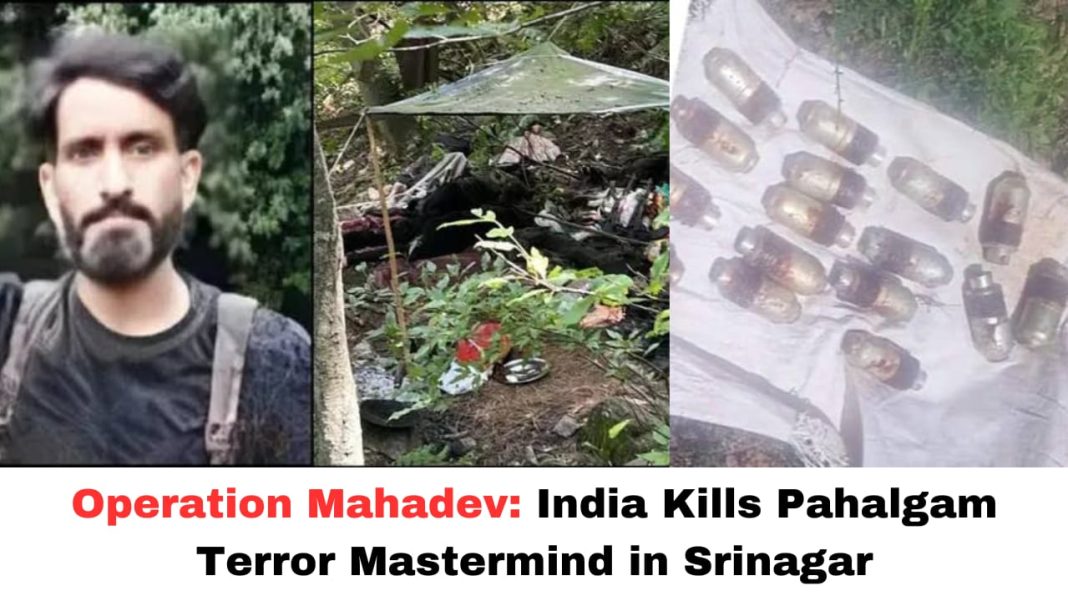Digital News Guru National Desk:
Operation Mahadev: India Avenge Pahalgam Attackers in Precision Counter‑Terror Strike
On July 28, 2025, Indian security forces launched a high-stakes joint counter‑terror operation near Srinagar’s Dachigam forest, named Operation Mahadev, targeting the perpetrators behind the April 22 Pahalgam terror attack that claimed 26 civilian lives in the Baisaran Valley.
Target & Context
- One of the neutralized militants was Hashim Musa, also known as Suleman Shah or Sulieman, identified as the mastermind behind the April 22 Pahalgam terror attack, which had killed 26 civilians—25 tourists and one local resident.

- Alongside him, two other A‑list militants, code‑named Afghan (Abu Hamza) and Jibran (Yarsi), were killed in the operation. All three were confirmed to have participated in prior terror missions, including the October 2024 Sonamarg tunnel attack.
Planning & Execution
- Intelligence agencies tracked activity using advanced signal interception. A suspicious encrypted satellite or “Chinese ultra‑radio” communication device prompted intensive surveillance beginning early July.
- After 14 days of persistent monitoring, the security forces zeroed in on a dense hideout in the Mulnar–Harwan–Lidwas area of Dachigam forest, concealed near Mahadev Peak.
- On the morning of July 28, an element of surprise was executed. The Chinar Corps-led operation—a joint effort of the Indian Army’s Rashtriya Rifles & para commandos, CRPF and J&K Police—engaged the militants in an intense firefight that lasted only a few hours.
- Drone surveillance supported the operation, helping secure the area and confirm fatalities swiftly.
Outcomes & Evidence
- All three terrorists were neutralized and their bodies recovered, along with weaponry including M4 Carbines, AK‑47s, rifle grenades and satellite communication gear.
- Home Minister Amit Shah, in Lok Sabha, confirmed that the slain individuals—Suleiman, Afghan, and Jibran—were the terrorists behind the Pahalgam attack. The names were corroborated by detainees who had harbored or supplied them earlier.
- According to Shah, the men were confirmed as Pakistani nationals, evidenced by weapon casings, Pakistani documents, ration items and direct identification by detained associates.

Analysis: Impact & Strategic Implications
- Symbolic justice and deterrence
The elimination of the Pahalgam mastermind nearly 96 days after the attack—aided by advanced surveillance and human intelligence—marks a powerful statement on India’s counter‑terror posture. It demonstrates an ability to act decisively beyond reactive strikes. - Coordination superiority
Operation Mahadev showcased seamless coordination among Army, CRPF and J&K Police, backed by drone networks and cryptographic intelligence—underscoring a shift toward modern, tech-driven counter-terrorism in J&K. - Cross-border message
By publicly confirming the terrorists’ Pakistani identities and denying any escape into Pakistan, the Indian government communicated a clear deterrent message across the Line of Control. - Continuing concerns
While Operation Mahadev removed key individuals, authorities and analysts warn of a potentially broader terror network and continued threat vectors—reinforcing the need for ongoing vigilance and similar targeted missions.
Operation Mahadev – At a Glance
| Feature | Details |
| Date | July 28, 2025 |
| Location | Harwan / Lidwas forests near Dachigam, Srinagar |
| Target | Suleiman Shah (Hashim Musa), Afghan, Jibran |
| Operation Duration | ~3 hours after 14 days of surveillance |
| Forces | Indian Army (Rashtriya Rifles, PARA SF), CRPF, J&K Police |
| Outcome | All three terrorists killed and identified |
| Evidence | Weapons, encrypted radio, Pakistani documents, ID by detainees |
| Government Response | Home Minister: confirmed identities & nationality; PM Modi: praised forces |
| Strategic Significance | Retaliation for Pahalgam, strong deterrence signal |
Conclusion
Operation Mahadev represents a defining moment in India’s fight against terrorism: a successful counter‑terror raid that neutralized high-value targets while upholding judicial and procedural norms. More than just vengeance for the Pahalgam atrocity, the mission signals India’s evolving intelligence capabilities, integrated force coordination, and assertive posture against transnational militant threats.
As Parliament continues its debates on national security and Operation Sindoor, Operation Mahadev stands as a concrete outcome of those domestic and strategic discussions—offering a blend of retribution, deterrence, and future resolve.
You May Also Read: Major Drug Bust at Ahmedabad Airport: 8.2 kg Hydroponic Cannabis Seized from Bangkok Passenger









